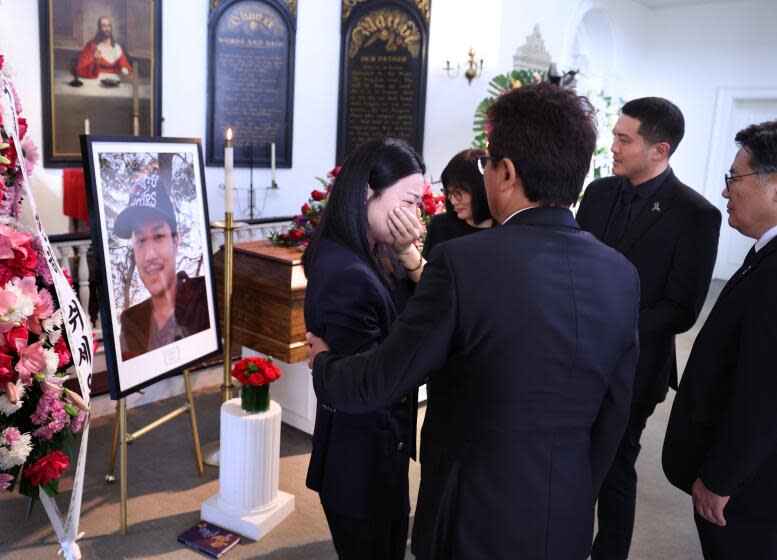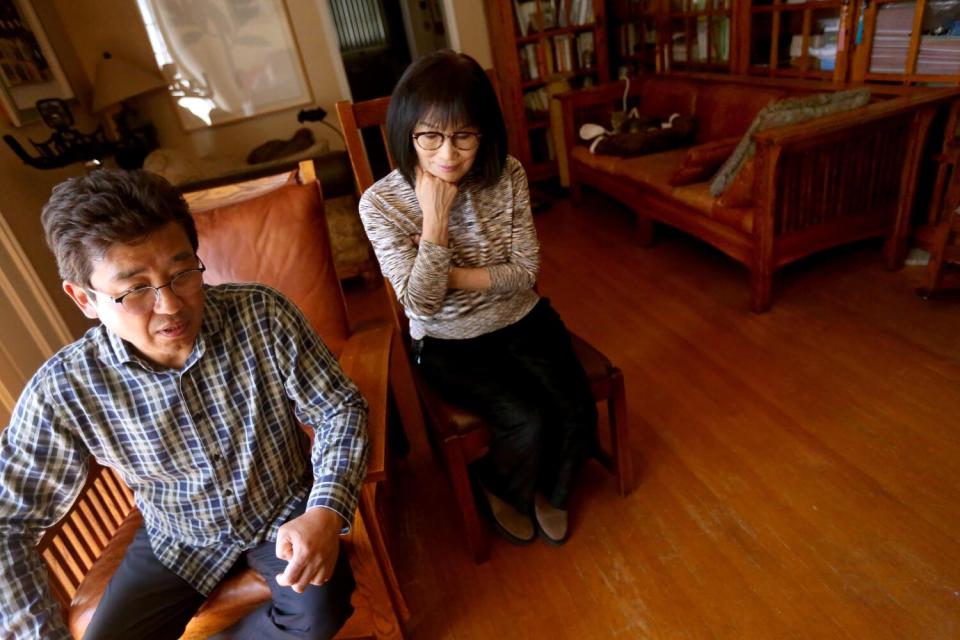Column: A Korean American family called for help. An LAPD officer arrived, shot mentally ill son

Whether you suffer from mild depression or severe schizophrenia, it’s a common fear that one moment of distress might undo all the work you’ve done to present a different face to the world.
Therapy and medication can't stop you from caring what other people think, especially those you love. So living with mental illness means accepting the labels others might apply to you — whether that’s crazy, disturbed, dangerous or toxic — but also fighting to show others a better version of yourself.
Yong Yang, 40, was winning that battle, according to loved ones, when police in May forced open the door of his parents' Koreatown home and found him in the midst of a hallucinatory episode with a kitchen knife in his hand.
Yong was having dinner there when he started hearing voices and confusing his words. The next day, his mother, Myung Sook Yang, called the county's psychiatric emergency response team for help. The clinician who arrived at the family home took less than three minutes to deem the troubled man dangerous and summon police, said Yong's father, Min Yang, who accompanied the clinician during the evaluation.
“I have a patient, he’s very violent, tried to attack me and the father,” the clinician told police, according to audio of the call released by the Los Angeles Police Department. “He has bipolar schizophrenia.”
Yong had less than 10 seconds to comply with a Los Angeles police officer’s commands before he was shot three times and died.
Min disputes that Yong tried to harm him or the clinician and says his son had never been diagnosed with schizophrenia. But it’s the label of "violent" the family particularly takes issue with. When a police officer with a gun becomes involved, that label can be lethal.
“Yong is not violent. These policemen are violent. They have weapons, they can barge in, they are ready to kill someone. My son was never violent until they opened the door,” Min said in an interview after the funeral.
In recent years, the city and county of Los Angeles have been testing new programs aimed at reducing the number of mentally ill people shot by police. In 2023, Los Angeles County spent $73.9 million on psychiatric mobile response teams, devoting a staff of 339 licensed clinicians to emergency response.
Weeks before Yong was shot, county officials had held an outreach event in Koreatown to publicize their mental health response efforts. And in March, the LAPD began testing a program that sends mental health practitioners instead of police to calls involving indecent exposure, intoxication, welfare check-ins and others.
Read more: Family demands answers after LAPD officers fatally shoot mentally ill man in Koreatown
But progress is slow. My colleague Kevin Rector found that of all the people LAPD officers shot from 2016 to 2019, nearly a quarter were perceived to be suffering from a mental illness. Last year, the LAPD opened fire 34 times, up from 31 the year before, an increase it attributed to an uptick in the number of cases involving people in a mental crisis holding sharp objects, according to a recent story by my colleague Libor Jany.
In 2021, Andres Lopez, the officer involved in Yong’s shooting, shot and wounded another mentally ill man who was waving a replica handgun outside the Olympic Division police station.
Cases such as Yong’s are difficult specifically because of the suspect’s inability to evince rationality. Is it reasonable to expect a person in the midst of a mental episode to snap back to reality and respond to a police officer’s shouted commands, all within 10 seconds?
A month later, his family is still struggling to understand how and why authorities decided he was dangerous. To them, Yong was sincere and soft-hearted, the kind of guy who was always adopting stray cats running around the neighborhood; who fussed over his parents if they ate too much rich food and scolded his twin brother, Yin, for cursing; who loved to sing and was known to hit high notes in Queen songs at karaoke.

He had battled severe bipolar disorder, manic depression and aural hallucinations for two decades, years of turbulence that often kept Min and Myung Sook up at night. But all that had changed recently, Yin said.
“It was the thing that really stressed me out more than anything. But recently, the last few years, I’ve been really happy too, because he was happy,” said Yin, Yong’s senior by three minutes. “It went from me worrying about him to him worrying about me.”
Yong grew tanned and fit from bike rides to weekly tennis matches and Griffith Observatory hikes with his parents. He adopted a grueling four-hour regimen of prayer, meditation and yoga to manage his disorders. At a party several years ago, he fell in love. For his girlfriend, he set aside his fear of loud noises and public spaces so they could attend EDM concerts and make music together. He lived in his own apartment, cooked all his own meals, kept his plants watered and his cats fed.
Read more: L.A. city, county roll out pilot program that sends mental health workers to 911 calls
There were still occasional episodes of disorientation and hallucination, but for the first time in two decades, he seemed to be enjoying his life, Yin said.
Yong was a rare success story among Asian American mental health patients. Asian Americans use mental health services at half the rate of the general population, according to UCLA researchers. A 2015 University of Maryland study estimated that a third of Korean Americans and Filipino Americans report symptoms of depression.
Cases such as Yong's — in which the patient lives a rich life and enjoys relationships with his family — are all too rare in the Asian American community, where stigmas linger about mental illness, therapy and psychoactive medications.
Yong and his family had grasped one of the most painful lessons that suffering teaches, both to those suffering and those supporting them: A return to normalcy is not guaranteed, but happiness is achievable if you can accept the new shapes it takes.

Yong's struggles taught Min that strength was not just standing tall but getting back up again. He began listening carefully to his son and found that Yong's struggles had made him wise. Even if he rambled at times, Yong had studied religion and philosophy to better understand himself, and he constantly surprised his father with his insight. It was an epiphany for Min, a well-known academic consultant who founded a popular after-school study program in Koreatown and often speaks on educational issues in the Korean media.
His consulting firm used to focus on future Ivy Leaguers, but now, he says, it works with students dealing with behavioral and mental health issues too.
“I realized my son is strong. He told me that he hears voices telling him to kill himself every day. If it was me, I couldn't stand that kind of situation. I really admired him,” he said.
But Myung Sook recalls endless searches for the right doctor, the right diagnosis, the right medication. Those early years felt like "walking over ice," she said at Yong's funeral. She has saved a Tupperware container crammed with pill bottles, medicine that Yong didn’t like because of the side effects. Once, she even took half a pill to try to understand what he was going through, but the medication didn’t work the same way on her.
Yong used to agonize over the possibility that he was embarrassing his family in public, clamping his eyes shut and reciting mantras to himself in order to remain calm. He was always trying to reassure his parents, promising that he would be strong enough to take care of them someday.
But now, Myung Sook said she believes it is the world that needs to change, not her son and others struggling with mental illness.
“Listen carefully, and try to understand them, because I think they need to be in our society," she said a day after her son's funeral. "Other than that, where can they go?"
This story originally appeared in Los Angeles Times.


